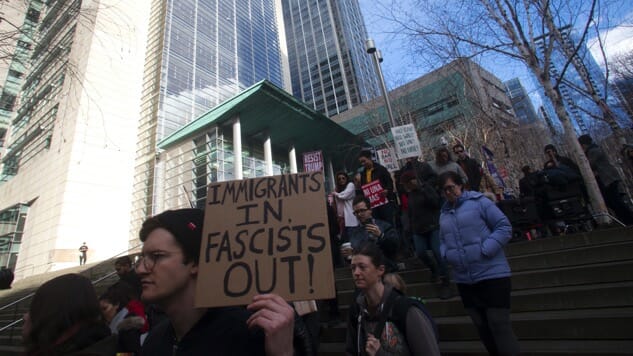Seven Racist Myths about DACA That You’ll Hear for the Next Few Weeks
Photo courtesy of Getty
Republicans and Democrats struck a budget deal that President Trump approves of, and just like that the U.S. government is back in business. The deal exchanged a vote to ensure beneficiaries of DACA (Deferred Action for Childhood Arrivals) don’t get deported—a program Trump unilaterally suspended about five months ago—with reinstating funding for CHIP—a program that guarantees healthcare to children in need, which the GOP quietly also ended about five months ago.
The Democrats wanted to fund both, but the GOP was the Joker in The Dark Knight, holding both hostage and offering a binary, zero-sum choice: Either delay a vote on DACA or needy kids don’t get healthcare. Trump summed up this fallacy in a pithy tweet.
In a moment we’ll debunk myths about DACA recipients (also called “Dreamers”). But first, to state the obvious, Trump is misleading us. The government can fund both programs. There isn’t one pool of money reserved solely for DACA and CHIP.
The GOP created a false choice, a simple and sinister argument that appealed to their simple and sinister base. They blamed Democrats for killing CHIP, even though the Republicans loaded the initial CHIP deal this fall with a poison pill about abortion coverage that they knew was a non-starter for Democrats. No, at its heart this argument is the same that the GOP has been making, successfully, since Democrats elected to the presidency a black man with an Arabic name: Democrats secretly don’t like America, i.e., they don’t like “real Americans,” i.e., white people.
I’m a Democrat and—hold on to your butts—I like American white people, and I also want kids in need to have healthcare. But I also want to offer opportunity to undocumented young people whose parents brought them to America when they were too young to have any say in the matter.
I’m not alone: something like 90% of Americans want DACA recipients to stay in the US. The MAJORITY of Trump supporters approve. Hell, even the violently anti-immigrant Sheriff Joe Arpaio said a couple weeks ago that he’d support DACA if Trump did. The President also feels this way, but he suspended the program because his aides told him that’s what his base wanted. But we—and by “we” I mean literally no one—still have no idea where the President stands on this issue. Neither, apparently, does the president.
Trump then tried to strike a bipartisan deal with Democrat leaders Schumer and Pelosi, but his racist base quickly turned their back. He got dragged back to his original position, which he didn’t actually want in the first place.
What a great negotiator.
But seriously: Ninety percent of Americans. What the hell is the issue here?
It’s a fig leaf for racism, is what.
Anyway, it’s still for some reason unclear whether the GOP will uphold its commitment to hold a vote on DACA before February 8, or whether that promise, like so many others, was made in bad faith. After all, it’s an election year, and unlike other years the far-right batshitters are voting as a bloc. Republicans can’t afford to alienate them and split off their votes, especially when facing a surge of support for Democrats. They’ll likely try to prevaricate some more—the program ends officially in March—so expect some shit-ass arguments about the DREAM act to come your way in about a week.
-

-

-

-

-

-

-

-

-

-

-

-

-

-

-

-

-

-

-

-

-

-

-

-

-

-

-

-

-

-

-

-

-

-

-

-

-

-

-

-








































